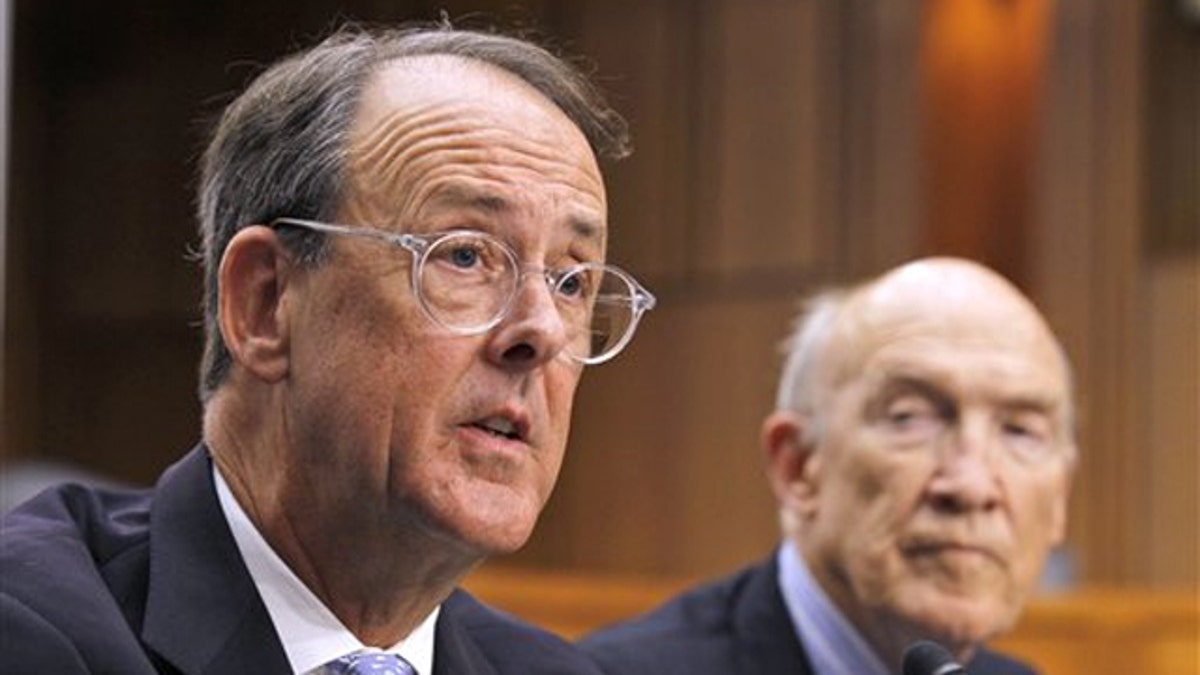
Debt Commission co-chairmen Erskine Bowles, left, and Alan Simpson speak to the media after a meeting in Washington Dec. 1. (AP Photo)
A sweeping proposal aimed at cutting $4 trillion from the budget over the next decade failed to win enough votes Friday to clear the commission President Obama entrusted to solve the nation's daunting fiscal problems.
The report from the 18-member deficit commission won the support of 11 members, short of the 14 necessary to be formally adopted. The vote does not preclude Congress from taking up any of the dozens of recommendations on the floor, but it virtually assures the proposals will not be considered as a single package.
Obama, in a written statement, said the panel's work underscores the need to face "difficult choices to curb runaway debt."
"It will require all of us, Democrats and Republicans, to find common ground without compromising the fundamental principles we hold dear," Obama said, inviting members of the commission to meet with financial officials in his administration about their findings.
The final report called for a host of changes to tax rates, spending levels, government health care programs and Social Security. It has been the target of criticism from interest groups across the political spectrum for months, but the panel's colorful co-chairmen had urged the public to disregard the claims made about their plan.
Despite falling short, Co-Chairman Erskine Bowles praised the work of the panel Friday and pleaded with lawmakers to keep up the "adult conversation about a very serious subject."
"It's now up to the members of Congress and the members of the administration ... to work together," he said.
Senate Democratic Leader Harry Reid and House Speaker Nancy Pelosi had earlier agreed to hold a vote on the package if it cleared the commission, though Speaker-designate John Boehner had made no such pledge.
The plan calls for dozens of minor and significant changes to U.S. fiscal policy. It would gradually raise the retirement age for Social Security over the course of the next several decades, while lowering cost-of-living adjustments. It calls for a cap on discretionary spending and temporary freezes in the salaries of federal workers and members of Congress. It calls for an increase in the federal gas tax, a change to the popular mortgage interest deduction and an overhaul of Medicare.
The plan won early support from the panel's Senate Republicans; they were later joined by Democratic Sens. Dick Durbin, D-Ill., and Kent Conrad, D-N.D. But every House Republican on the panel voted no, including Wisconsin Rep. Paul Ryan, the top Republican on the House Budget Committee. Ryan had earlier expressed concern about the health care provisions in the plan.
Co-Chairman Alan Simpson, a former senator whose off-color comments got him in trouble several times over the course of the commission's tenure, told reporters Friday he was going to "get the hell out of town and go sleep on the streets" following the final meeting. He gave a parting shot to those who cast doubt on the process.
"Democracy's in deep trouble when the two most disgusting bodies in America are politicians and journalists," Simpson said.




